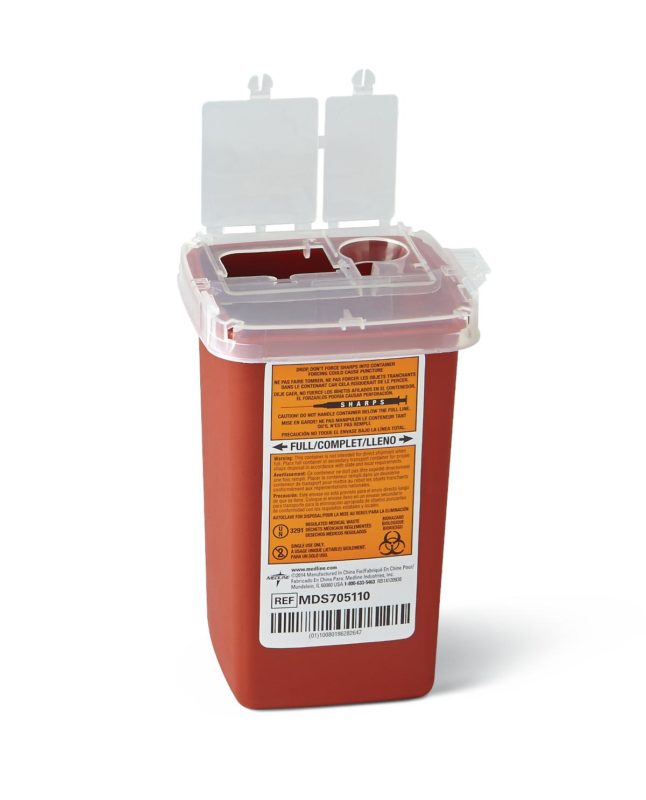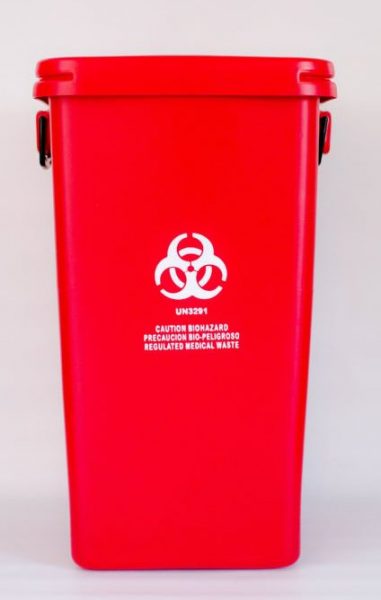Shielding Health And Wellness: Specialist Medical Waste Removal Services for a Tidy Environment
Shielding Health And Wellness: Specialist Medical Waste Removal Services for a Tidy Environment
Blog Article
Remain Ahead of Rules: Expert Recommendations on Medical Garbage Disposal
In a globe where the health care market is continuously developing, it is imperative for clinical centers to remain ahead of policies when it comes to the proper disposal of clinical waste. From recognizing the various categories of clinical waste to applying the ideal collection and segregation approaches, this conversation will certainly offer valuable understandings and actionable tips to aid facilities remain in advance of policies in the ever-changing landscape of medical waste disposal.
Recognizing Medical Waste Categories
Understanding clinical waste classifications is important for correct disposal and administration in health care centers. Clinical waste refers to any waste created by health care tasks that may present a risk to public wellness or the environment. It is critical to categorize clinical waste properly to ensure its risk-free handling, disposal, transportation, and treatment.
There are several groups of clinical waste that healthcare facilities require to be aware of. The most typical groups include contagious waste, pathological waste, sharps waste, pharmaceutical waste, and chemical waste. Each group has specific guidelines and guidelines for its correct monitoring and disposal.
Pathological waste refers to human tissues, organs, or body parts that require special handling and disposal. Drug waste comprises ended, extra, or infected drugs that require careful handling and disposal.
Staying Up-To-Date With Regulatory Changes
Remaining present with regulative modifications is critical for medical care centers to make certain conformity and appropriate management of medical garbage disposal. medical waste removal near me. With guidelines regularly developing, it is vital for healthcare centers to remain up-to-date to avoid fines, fines, and potential injury to the atmosphere and public health
To remain in advance of regulative changes, medical care centers must establish a system for surveillance and monitoring updates. This can be done by signing up for regulatory e-newsletters, participating in meetings and workshops, and actively participating in industry organizations. Furthermore, facilities need to mark a personnel or team responsible for staying notified and distributing information to pertinent stakeholders.
Routine interaction with regulative firms is likewise vital. Health care centers ought to develop connections with neighborhood, state, and federal firms to ensure they recognize any kind of changes in guidelines that might impact their waste administration techniques. This can be done through normal conferences, participation in public remark durations, and proactive interaction with regulative companies.
In addition, medical care facilities need to think about partnering with waste management firms that specialize in clinical waste disposal (medical waste disposal services with WasteX). These firms are frequently skilled in the current policies and can supply advice and assistance to ensure compliance
Executing Appropriate Collection and Partition Methods
To successfully manage medical waste disposal, health care facilities need to develop correct collection and partition approaches in conformity with governing standards. Applying these approaches ensures the secure handling and disposal of possibly unsafe products, shields the setting, and lessens the danger of injuries and infections to medical care employees and the public.
Proper collection and segregation methods entail the usage of assigned containers and identifying systems. Health care facilities should provide plainly classified containers for various kinds of medical waste, such as sharps, infectious waste, pharmaceutical waste, and non-hazardous waste. These containers need to be color-coded and plainly significant to avoid confusion and promote easy recognition.
Furthermore, health care centers must train their staff on the proper treatments for accumulating and setting apart medical waste. This includes enlightening them on the various check over here sorts of waste, the proper containers to utilize, and the value of complying with guidelines and policies. Regular training sessions go now and correspondence course ought to be conducted to make sure that staff members continue to be updated on ideal methods.
Additionally, medical care facilities should establish a system for normal collection and disposal of medical waste. This might involve partnering with qualified waste administration firms that specialize in clinical waste disposal. These business will certainly guarantee that the accumulated waste is delivered and gotten rid of in conformity with regulatory demands.
Choosing the Right Disposal Techniques

Incineration is just one of the most effective and common techniques for taking care of certain types of medical waste, such as pathological waste and sharps. It involves the controlled burning of waste at high temperature levels, reducing it to ash. Incineration can release hazardous pollutants into the air and contribute to air pollution.

Chemical treatment includes the use of chemicals to decontaminate and neutralize the waste. Microwave treatment utilizes microwave energy to warm and sanitize the waste.
Making Certain Conformity Via Documentation and Training
After carefully thinking about the suitable disposal techniques for medical waste, healthcare facilities must ensure compliance with regulations and minimize environmental impact by implementing effective documents and training treatments. This action is vital in keeping a risk-free and lasting environment for both healthcare workers and the basic public.

Training is just as important in guaranteeing conformity with laws. Healthcare workers that take care of medical waste ought to get ideal training on waste segregation, dealing with, and disposal treatments. This training needs to cover subjects such as the proper use of personal protective devices, recognition of various kinds of waste, and the correct disposal methods for every waste classification. By giving thorough training, healthcare facilities can empower their personnel to make educated decisions and lessen the threat of inappropriate garbage disposal.
Final Thought
In final thought, staying ahead of policies in medical garbage disposal is crucial for healthcare centers. medical waste removal. Recognizing the various classifications of medical waste, staying upgraded with regulative changes, implementing proper collection and partition techniques, choosing the ideal disposal approaches, and making sure compliance through documents and training are all necessary steps. By following these standards, health care organizations can properly handle and dispose of clinical waste in a risk-free and responsible fashion
From comprehending the different classifications of medical waste to applying the best collection and partition techniques, this discussion will certainly provide workable suggestions and valuable understandings to help centers stay in advance of regulations in the ever-changing landscape of clinical waste disposal. - medical waste disposal services with WasteX
The most typical groups consist of contagious waste, pathological waste, sharps waste, pharmaceutical waste, and chemical waste. Health care centers need to provide clearly labeled containers for different types of medical waste, such as sharps, contagious waste, pharmaceutical waste, and non-hazardous waste. Health care facilities must develop a thorough system to videotape and track all facets of clinical waste disposal, consisting of kinds of waste created, amounts, and disposal approaches made use of. Medical care employees that take care of clinical waste needs to obtain ideal training on waste partition, taking care of, and disposal treatments.
Report this page